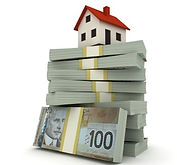



It's Your City. Live In It.
FIND YOUR DREAM HOME

SERVING YOUR EDMONTON REAL ESTATE NEEDS
FOR SELLERS
-
Clean out your home. As soon as you decide to sell your house, thoroughly clean it from top to bottom. Don't forget rarely-cleaned areas such as baseboards, blinds, roof gutters and window wells. A clean home will help an appraiser see your house in a better light and value it more highly, as well as appealing to buyers.
-
Because of familiarity, you're likely to overlook some aspects of cleaning that scrutinizing potential buyers won't. If you want to make the best possible impression, shell out some extra cash to hire a professional cleaning service, at least for an initial deep clean. Don't underestimate the power of a spotless canvas.
-
Clear up clutter while you clean. Make your home look more spacious by getting rid of any unnecessary junk (hire storage space if you have to). You'll see a big difference in how your closets look, as well as your garage, porch and bathroom. Buyers want to feel like they're purchasing sufficient space, and clearing out more of your stuff helps them see themselves in your home. If you can't bear to part with anything, consider moving the items to a storage unit temporarily.
-
-
Have your property evaluated. As much as you'd like to set the price of your home as high as possible, you have to be realistic. Many for-sale-by-owner listings fail to sell because owners persist in thinking their home is worth more than the market will offer, or because they have already settled on a set amount of money that they want and refuse to budge. Having a professional, third-party assessment of your home's worth will help you get comfortable with a price range, in addition to providing you with a solid reference point if a buyer or realtor accuses you of setting the price too high.
-
Don't just rely on the property tax assessment. Many property tax assessments are out of date, and they don't necessarily reflect the current real estate market.
-
Look at comparables. Comparables are what other similar homes in your area are selling for, or better yet how much they have sold for in the last month. Using this method of how to sell your house what price range your home will fall in. Always use comparables when arriving at a realistic assessment of your home's value.
-
Hire an appraiser. A certified residential appraiser will come to your house, measure the property, take notes and photos, research information about any land parcels, and assemble a list of comparable sales in your neighborhood to determine the value of your home. A visit from an appraiser will cost you far less than the services of a real estate agent, and the value the appraiser sets will be more accurate. Many banks keep a list of reputable appraisers they contact for refinancing or mortgage loans; ask your local branch manager to refer you to an honest, qualified professional. Once you receive your copy of the appraisal, make a second copy and store it in a secure location. Keep the first copy on-hand to go over with serious buyers.
-
-
Have your home inspected. Many standard real estate contracts are going to give the home buyer the right to inspect the property, so be prepared. Have your home inspected before you advertise. Under a general inspection you might be obligated to make major repairs to appliances, plumbing, septic, electrical and heating systems, etc. You can expect your home’s roof and foundations to be inspected, as well. Follow the recommendations and make necessary repairs. Additional inspections requested by the buyer are customarily at their expense
-
As much as possible, get your home in move-in condition before you put it on the market.[1] Buyers of homes are inherently lazy. If they feel like they'll need to do extra landscaping, plumbing, appliance and electrical work before they can enjoy the house, they'll balk when it comes to buy, even if the rest of your house is an absolute steal. So make it easy for them. Hire a handyman or general contractor to get the home as ready to move into as possible.
-
Know your selling points. Before you start marketing your home, write up a list of special selling points you think will attract buyers. Potential items include good school districts, recent renovations, benefits that have been grandfathered into the property, energy-saving windows or insulation and new appliances. Highlight these items in your ads, when you talk to people about your home or while you're showing it. Memorize them so that you don't forget anything.
-
Time it right. Be aware that the real estate sector sees a noticeable uptick in business over the summer — people prefer to move when it's warm, and they're reluctant to have their children change schools in the middle of the school year. Start trying to sell your home in April or May and continue to promote it throughout the summer. If you haven't sold it by late fall, scale back your efforts and begin marketing more intensely when the weather warms up again.
-
Another thing to be aware of is the trend your neighborhood is going through. If your neighborhood is undergoing a mini boom of strong residential sales, those transactions will increase the value of your home. Conversely, if your neighborhood has seen a lot of short sales or foreclosures, your home's value will be decreased. Try to time your listing so that you're not affected by distressed sales. For instance, in most areas, a comparable sale can only weigh against the value of your home for 90 days after the sale date. It might be worth it to wait a few months to list your home if you can do it at a higher price.
-
Showing the House and Attracting Buyers.Get your property ready for a staging. A staging is an especially important part of selling your house. During the staging, potential buyers begin mentally imagining their own items, and their lives, in your home. If they can't make the imaginative leap because the house is too cluttered, dirty, colorful, or quirky, you've probably lost their business. Best to stage the house to be as spacious, clean, bland (yes, bland!), and typical as possible.
-
Try to limit furniture in your house to the absolute essentials. If you haven't used it in three months, store it, sell it, or throw it away. This helps the rooms appear larger. Replace or hire replacement for items that are outdated or don't complement your home.
-
Show items in groups of 1, 3, and 5 items, erring on fewer items when possible.[2] It's not clear why odd groups of items are mentally appealing, but they are. Freshen up rooms with fresh flowers and bowls of fruit. Use scatter cushions and glass vases to liven up the room.
-
Go into each room and paint as needed. Paint the walls white to brighten up your home. Remember, neutral is best when you’re selling so potential buyers can customise the property to their tastes. Check the carpets and windows in each room and clean as well.
-
Don't neglect bathrooms and the kitchen. Use fluffy white towels in the bathroom and even put an orchid in there. Don't have too many appliances and or pots and pans visible in the kitchen, a bowl of fruit and 1-2 appliances/pans are more than enough for the kitchen to look homely but not crowded.
-
Remove any personal photos and items - these tend to make buyers uncomfortable.
-
The style of your house should appeal to the demographic of your potential buyers. For example you will use different property styling if you're selling a bachelor pad or a family home. And remember: if your house is decorated in a very specific style, this might not match the style of your potential buyers.
-
Pay attention to how the outside of your home looks. Clear away any plants that obscure significant parts of the home, weeding and mulching as necessary. Check in on the condition of the paint on the outside of the home; inspect how it looks from both the curb and up-close. Invest in potted plants and place them at the entry or on the balcony/courtyard. Put yourself in the shoes of the buyer!
-
Take professional photos that show the best of each room (and outside area). If you have a room bathed in sunlight, take a picture of that room on a sunny day (early morning or late afternoon), even if the photographer wouldn't approve. In other rooms, turn on all artificial light when taking pictures, even if there is enough light - it creates a special ambiance.
-
Try to close cleanly and quickly. Once the buyer is making offers and negotiating, try to close the transaction as quickly as you can. Make sure you've provided all the necessary disclosure documents required by your state. If you don't like the buyer's offer, don't just say no. Always make a counter offer. Try to accommodate the buyer wherever you can afford to. Also, consider taking the offer to a lawyer for professional evaluation. Once everything is settled, move out as quickly as you reasonably can.





